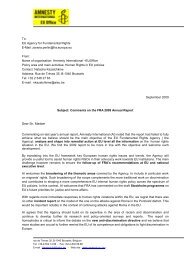Time for eULeX To prioriTize war crimes - Amnesty International ...
Time for eULeX To prioriTize war crimes - Amnesty International ...
Time for eULeX To prioriTize war crimes - Amnesty International ...
Create successful ePaper yourself
Turn your PDF publications into a flip-book with our unique Google optimized e-Paper software.
60<br />
Kosovo: <strong>Time</strong> <strong>for</strong> EULEX to prioritize <strong>war</strong> <strong>crimes</strong><br />
progress in the prosecution of <strong>war</strong> <strong>crimes</strong> in Serbia has been relatively slow. While the court<br />
has jurisdiction over all <strong>crimes</strong> against international law, including <strong>war</strong> <strong>crimes</strong>, <strong>crimes</strong> against<br />
humanity and genocide, prosecutions to date have been brought only <strong>for</strong> <strong>war</strong> <strong>crimes</strong>,<br />
including on the grounds that <strong>crimes</strong> against humanity was not a distinct offence in the<br />
1976 Basic Penal Code in <strong>for</strong>ce during 1990s. 174<br />
OPTIONS FOR KOSOVO<br />
Both international and local prosecutors and judiciary interviewed by <strong>Amnesty</strong> <strong>International</strong><br />
were agreed on the necessity to retain an internationalized court <strong>for</strong> the prosecution of <strong>crimes</strong><br />
under international law <strong>for</strong> the <strong>for</strong>eseeable future.<br />
In their 2010 report on <strong>war</strong> <strong>crimes</strong> in Kosovo, the OSCE advocated the establishment of a<br />
Special War Crimes court or dedicated chamber. 175 A similar idea had been previously<br />
proposed in 1999-2000 by the Technical Advisory Commission on Judiciary and Prosecution<br />
Service which had recommended to UNMIK Department of Justice that a separate court be<br />
established to try <strong>war</strong> and ethnically-motivated <strong>crimes</strong>. The Kosovo War and Ethnic Crimes<br />
Court (KWECC) was proposed as an extraordinary court within the Kosovo legal system,<br />
composed of local and international judicial personnel. It was to have jurisdiction over cases<br />
involving grave breaches of the Geneva Conventions, violations of the laws or customs of <strong>war</strong>,<br />
genocide, <strong>crimes</strong> against humanity and other <strong>crimes</strong> committed on political, racial or<br />
religious grounds in Kosovo since 1 January 1998.<br />
It was anticipated that the KWECC would have primacy over other domestic courts, and<br />
would be able to assume jurisdiction, on the determination of the Chief Prosecutor, over a<br />
case at any given point. The KWECC was to be composed of panels with both local and<br />
international representatives, but its President, Vice President, Chief Prosecutor, Deputy<br />
Chief Prosecutor, Registrar and staff would all be international. It was planned that the<br />
KWECC would work together with Kosovar judges and prosecutors on these complex cases as<br />
one <strong>for</strong>m of capacity building.<br />
The UNMIK Department of Judicial Administration spent a great deal of time and ef<strong>for</strong>t in<br />
developing operational plans to establish the court and continued into 2000.By March 2000,<br />
the UN Secretary-General in his report to the Security Council referred to the Court’s<br />
establishment. It was then reported in June 2000 that the chief international prosecutor <strong>for</strong><br />
the KWECC had been appointed and had arrived in Kosovo and that the Court was expected<br />
to start work in the summer. However, the KWECC never materialised. The reasons suggested<br />
<strong>for</strong> its abandonment vary, but it seems concern as to the financial implications, United<br />
States reluctance and the establishment of the <strong>International</strong> Judges and Prosecutors<br />
Programme in February 2000 led to the proposal being quietly laid to rest by the end of<br />
2000. 176<br />
While <strong>Amnesty</strong> <strong>International</strong> does not propose that the KWECC be resuscitated, the<br />
organization notes that, with the establishment of the SPRK, a <strong>for</strong>mal structure allowing the<br />
prosecution of <strong>war</strong> <strong>crimes</strong> and other serious <strong>crimes</strong> by a specialized prosecutorial body,<br />
including both local and international prosecutors is already in place.<br />
“The SPRK will be the main authority <strong>for</strong> <strong>war</strong> <strong>crimes</strong> and organised crime. But <strong>for</strong> this we<br />
need to have a Special Chamber or such a court - with financial stimulation, better<br />
<strong>Amnesty</strong> <strong>International</strong> April 2012 Index: EUR 70/004/2012



